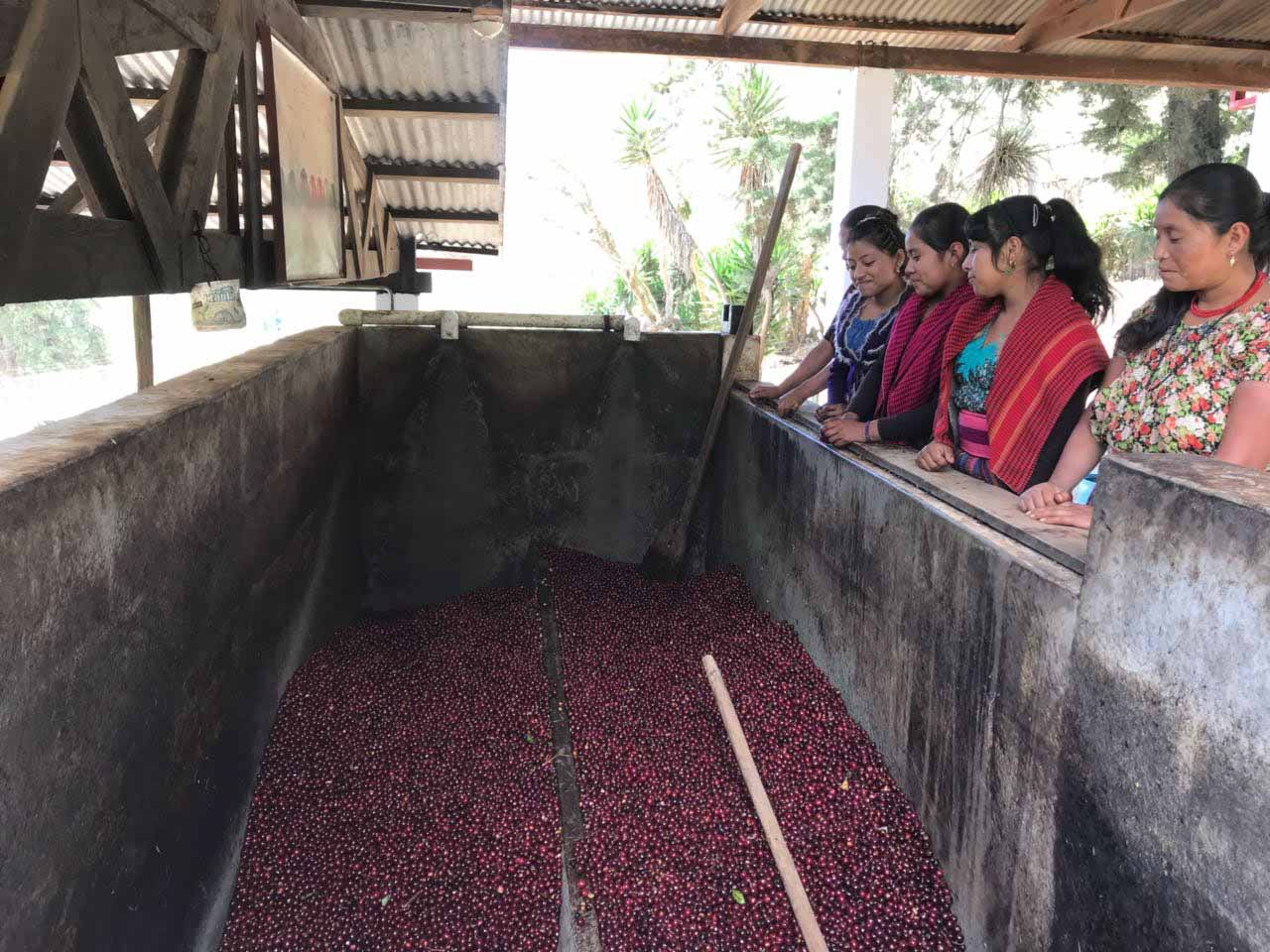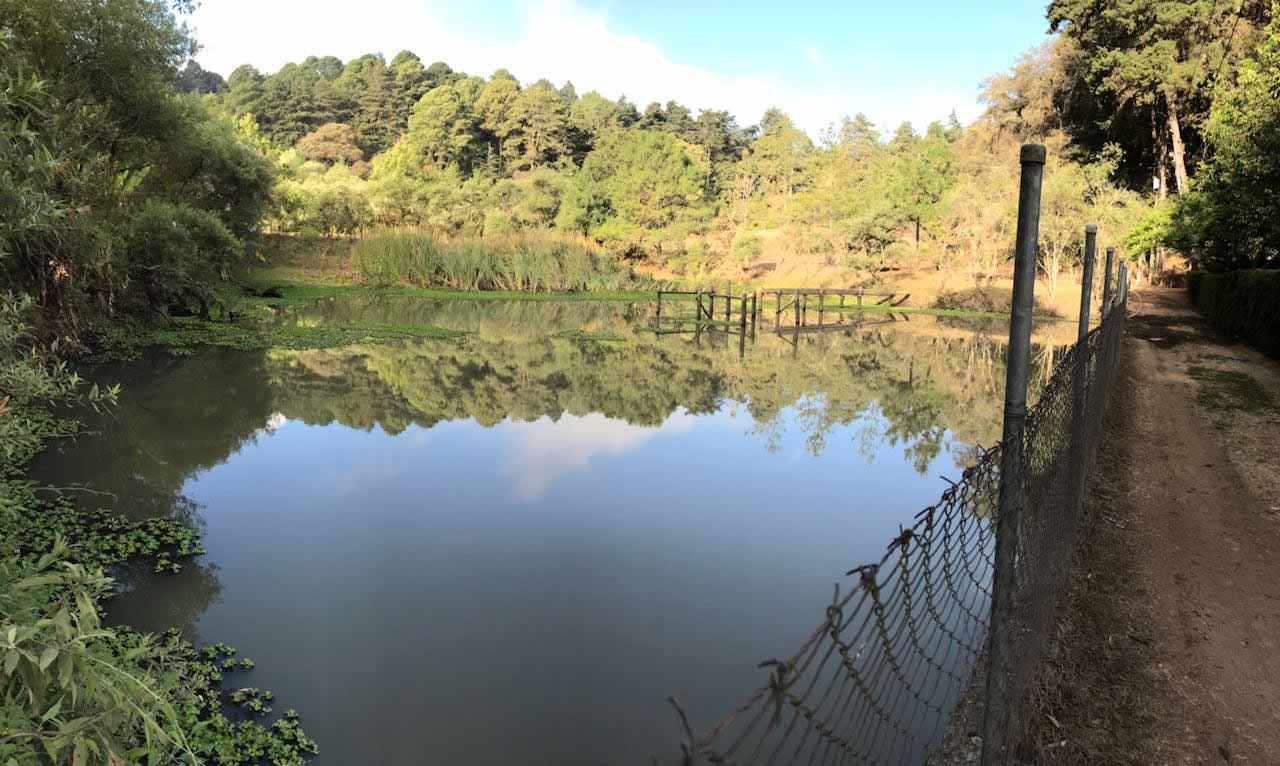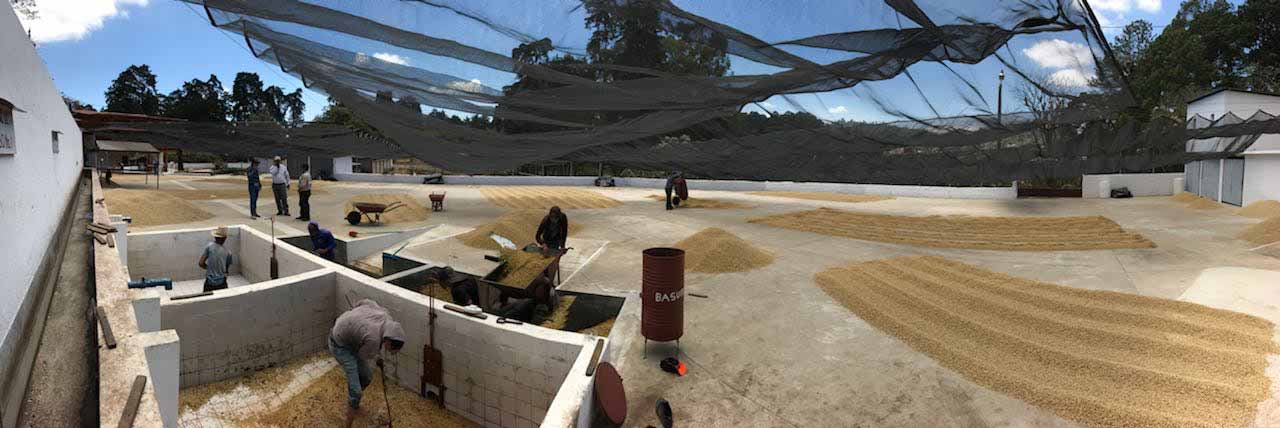-
Producer
-
Guillermo Sanchez
-
Country
- Guatemala
-
Region
-
San Juan Sacatepequez
-
Altitude
-
1800m above sea level
-
Varieties
-
Process
-
Harvested
-
March 2018
-
Importer
-
Shared Source
-
Body
-
Medium
-
Acidity
-
Bright
-
Tasting notes
-
Peach, brown sugar, lime
-
Roast style
Guatemala
Guillermo Sanchez
San Jose Ocaña EstateSan José Ocaña is 175 hectares, small for a Guatemalan estate. Guillermo’s father used to farm on a lot more land, but when Guillermo took over in 2013, he reduced the farm size and started focusing on regenerative farming and specialty processing.
He planted a lot of shade trees and lots of small experimental parcels of different varietals – we’re eagerly awaiting first cuppings! He set about transforming the way coffee was picked and processed.

He pays pickers more than any of his neighbours to select only the ripest cherries and his water recycling system is hyper efficient, using several tanks to separate solids from clean water, re-using water in the wet mill, capturing all the coffee mucilage post- washing and applying this to the pasture.
Guillermo only uses organic fertilisers, a significant proportion of which he creates himself with one of the most productive and intense worm-farm and organic compost systems we’ve seen. There are many cows and sheep that graze the plantation and whose sole purpose is to produce manure for the worm farm.
Guillermo fertilizes pasture with the tiny amount of waste water that leaves his wet mill; sheep horses and cows eat the straw; their resulting business is fed to the worms along with coffee pulp and transformed into biologically enriched organic fertilizer that, of course, feeds the coffee plants and the farm’s veggie patch.

His farm is heavily shaded, mostly with native pine. In fact he has a large agro-forestry project going to protect native species. He is an agronomist by trade and has worked as an engineer for chemical fertilizer companies. Obviously, he has a legitimately deep understanding of plant nutrition (like, next level beyond our heads) and also knows that if you farm smart, you don’t need to apply chemical fertilisers. He uses only organic fertilizers to complement his compost.
He is similarly employing many biological controls of farm pests and diseases Guillermo has a very ingenious fermentation and water recycling system that does more than produce zero wastewater.
Using various tanks, pumps and gravity, Guillermo cleverly captures the fresh water used to wash the parchment, allows the dirty mucilage solids to float to the top, and then pumps the clean water from below back to the fermentation tank to kick start fermentation of freshly depulped cherries day’s pickings.

Fermentation at this cold high altitude lasts around 36 hours – it would be dangerously longer than this if it weren’t for Guillermo capturing bacteria and yeasts in the washing process. Fermented parchment is soaked for 24 hours before being taken to patio where it is gently shade dried over about two weeks.
Learn everything about this coffee:
Ethical, traceable sourcing
This page has all the sourcing information (variety, process, region, story, importer, and more) that our importers share with us, and give us permission to use.
The transparency helps us talk confidently about the quality and background of our product, and it helps you know exactly what you’re buying.
Learn more:
Coffee page transparency legend
Our coffee philosophy
Our business approach
Fresh harvest coffee
We only source and roast coffee from each country’s latest harvest season (so the green coffee is never older than 1 year from the time of picking, processing and packing). This ensures the sensory qualities are always at their peak and unaffected by excessive ageing.
Roasted for espresso and filter (best enjoyed black)
Roast style: omni. Omni roasts are designed to brew and taste great both as espresso and filter. Our omni single origins generally sit on Agtron values in the ~70-60 value range. So, technically, they are somewhere in the lighter side of the medium spectrum.
Designed for espresso and filter brewing. Best enjoyed black.
Learn more:
Our Loring Kestrel S35 roaster
Our roasting style and approach
Best brewed within days 15-49 post-roast
The ‘fresh is best’ saying doesn’t apply to coffee (contrary to popular belief). Waiting before opening and brewing your bag of whole coffee beans helps develop peak flavour and acidity.
But heads up: if you buy pre-ground coffee, brew it as soon as possible.
Learn more:
Our recommended brewing window
Try our custom brewing recipes
Our recipes and ratios are tailored to our coffee sourcing and roasting styles, bringing the best flavour and feel out of each coffee.
For pour over, immersion, and other filter brewing styles, check our brew guides.
For our espresso single origins, we recommend a coffee:yield ratio of 1:3:
- Dose: 20g ground coffee
- Yield: 60g espresso
- Total brew time: ~24-28 seconds
This is just a starting point! We encourage you to experiment, taste, and adjust to find the recipe that you enjoy the most.
Learn more:
Our espresso brew guide (single origin)
Brewing ratio calculator
Packaging and sustainability
- Bags: ABA-certified home compostable (AS 5810-2010)
- Labels: recyclable
- Valves (only on +250g bags): general waste
- Box and tape (online orders): recyclable
Learn more:
Our packaging
Varieties
Bourbon variety
A natural mutation of the Typica varietal, Bourbon is named after Reunion Island (then known as Il Bourbon) where the French cultivated the Typica plants which naturally mutated.
Catuai variety
Created by the Instituto Agronomico do Campinas in Brasil, Catuai is a hybrid varietal between Caturra and Mundo Novo.
The location
Coffee from Guatemala
Guatemala’s production of coffee first grew in the 1860s on the back of a declining indigo trade, which had previously existed as it’s main export. Up until 2011 Guatemala was in the top 5 highest producing coffees nations in the world, before being overtaken by Honduras.
Farm processes
Washed process
Machines are used to remove the flesh from the coffee cherry before being fermented in water, washed again, and finally sun dried. This process tends to result in more distinct, cleaner flavours.

Subscribe to a world of coffee
Discover a new single origin coffee from Sample every 1-5 weeks with no delivery fees.
No up-front purchase, and you can pause, cancel, or change plans at any time.
Available to order online this week:

Peru Miguel Estela
Flavours of honeydew melon, white grape, marmalade
Body Acidity
Washed Marshell
August 2025 harvest
Roasted omni for filter and espresso
Peru Miguel Estela online
Ethiopia Tadese Teko
Flavours of bergamot, mandarin, mango
Body Acidity
Washed Ethiopian Heirloom
January 2025 harvest
Roasted omni for filter and espresso
Ethiopia Tadese Teko online
Mexico Isavel Lopez Pablo
Flavours of sugarcane, dried cranberry, white peach
Body Acidity
Washed Typica
April 2025 harvest
Roasted omni for filter and espresso
Mexico Isavel Lopez Pablo online
Colombia Rigoberto Chavarro
Flavours of brown sugar, wine gum, candied stone fruit
Body Acidity
Washed Pink Bourbon
February 2025 harvest
Roasted omni for filter and espresso
Colombia Rigoberto Chavarro online